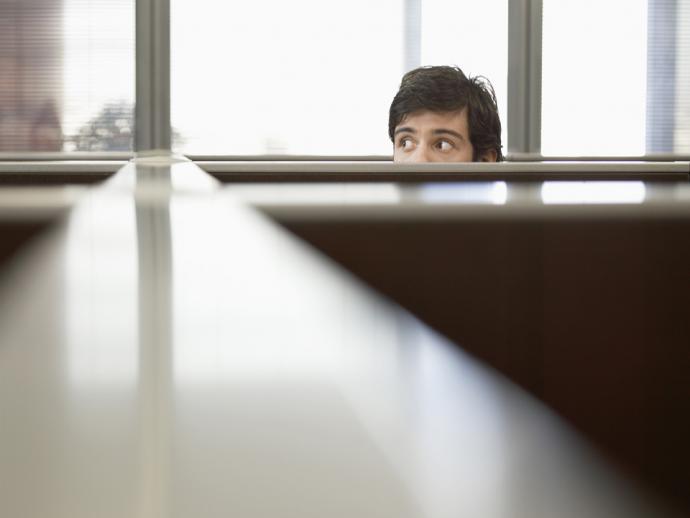Phobias

This factsheet is for people who have a phobia, or who would like information about them.
A phobia is an irrational sense of anxiety or fear triggered by exposure to a specific object or situation. People with phobias have a strong desire to avoid whatever is causing their fears.
About phobias
Symptoms of phobias
Complications of phobias
Causes of phobias
Treatment of phobias
About phobias
Fear is a form of anxiety triggered by something in your surroundings. If the situation is a real threat – for example, you're being attacked – fear is a completely sensible and appropriate reaction. With phobias, the fear is irrational because you have an exaggerated or unrealistic idea about the harmfulness of the situation.
If you have a phobia, you may realise that your fear is out of proportion to the true danger or threat, but you can't control or explain it. You will try to avoid the object or situation you fear, which can affect your daily life.
Types of phobias
There are two main groups of phobia – specific (or simple) phobias and complex phobias.
Specific (or simple) phobias
These are restricted to very specific situations and usually begin in childhood or adolescence. Most people grow out of them, but for others they can be a life-long problem. The most common types of specific phobias include the following.
- Animal phobia. This is usually a fear of spiders, snakes, mice, birds or insects.
- Environmental phobia. This can be a fear of thunderstorms, heights or water.
- Situational phobia. This can be a fear of flying, visiting the dentist or being in small spaces (claustrophobia).
- Body-related phobia. This can be a fear of injections, blood or vomit.
Sometimes, people can become phobic about catching illnesses or anything that puts them at risk of vomiting or choking.
Specific phobias are more common in women than men, and they often begin in childhood. People who suffer from these phobias rarely have any other psychiatric or psychological problems.
Complex phobias
These are restricted to very specific situations and usually begin in childhood or adolescence. Most people grow out of them, but for others they can be a life-long problem. The most common types of specific phobias include the following.
- Agoraphobia. This is a fear of open spaces or being in places or situations where you feel you can't escape. For example, you may have a fear of leaving home, being in a crowd or standing in a queue, being on a bridge, or travelling in a car, train or bus.
- Social phobia. This is a fear of being watched and judged in social situations. For example, you might worry that you will do something embarrassing, or that people are going to be critical of you.
Symptoms of phobias
If you have a phobia, you usually won't have any symptoms until you're faced with your feared situation or object – or sometimes if you think about, or see a picture of it. You may then develop symptoms of anxiety, which include:
- the sensation of feeling your heart racing (palpitations)
- sweating
- feeling dizzy, light-headed or faint
- churning of your stomach
If you hyperventilate (breathe at an abnormally rapid rate), you may also have numbness and pins and needles.
These sensations may become so unpleasant that you change your behaviour to avoid coming into contact with your feared object or situation.
Complications of phobias
If you have a phobia, you will try to avoid the object or situation you fear and this can affect your mental health in other ways. For example, you may feel lonely and isolated if you become unable to leave your home, go shopping or meet with friends. As a result, you may become depressed.
If you use alcohol or drugs to cope with your feelings, then you can increase your risk of developing alcohol and drug-related health problems.
Causes of phobias
There are different theories about what causes phobias to develop.
Phobias may run in families, but how much this is to do with learning them from your parents or siblings and how much is inherited through your genes is uncertain.
Sometimes the start of a phobia may be triggered by a frightening situation or place, which caused you to feel anxious at the time.
Treatment of phobias
-
Self-help
The best way to get over a phobia is to repeatedly expose yourself to your feared object or situation and to tolerate the anxiety until it starts to decrease. Some people find they can do this on their own, or with the help of self-help books, support groups, family and friends.
-
Talking therapies
There are different types of talking therapies, such as counselling and psychotherapy. Most treatments will take a similar approach known as cognitive behavioural therapy (CBT). This involves one-to-one sessions with a therapist trained in treating phobias. Your therapist will help you to identify links between your thoughts, feelings and behaviour and advise you how to develop coping skills. He or she may also teach you relaxation techniques and then gradually expose you (first in your imagination then in a safe and controlled way in reality) to the object or situation that you fear. You will learn to tolerate the anxiety triggered by exposure with the help of relaxation techniques.If you see a doctor about your phobia, he or she may be able to refer you to a suitable therapist.
-
Medicines
Medicines are rarely used to treat phobias because talking therapies can usually be very successful. Your doctor may, however, prescribe medicines to help you manage the physical symptoms of anxiety while you learn to overcome your phobia. For example, he or she may recommend taking a benzodiazepine or beta-blocker. If you also have depression, taking an antidepressant can help. Always ask your doctor for advice and read the patient information leaflet that comes with your medicine.
Availability and use of different treatments may vary from country to country. Ask your doctor for advice on your treatment options.
This section contains answers to common questions about this topic. Questions have been suggested by health professionals, website feedback and requests via email.
If I have one phobia, am I more likely to have another?
What can I do to help my friend, if they have a phobia?
How many people are affected by phobias, and what is the most common type?
If I have one phobia, am I more likely to have another?
Yes. Many people who have one phobia have other types of phobia at the same time.
Explanation
If you have one type of phobia, you may be more likely to have phobias about other things too. For example, agoraphobia is a complex mix of phobias that stop you from travelling long distances or leaving your home. If you have agoraphobia, you’re afraid of being in situations where you feel you can't escape. This can include fear of being in a crowd or standing in a queue, being on a bridge, or travelling in a car, train or bus. If you have agoraphobia, you may also have monophobia (a fear of being alone) or claustrophobia (a fear of being in a confined space).
What can I do to help my friend, if they have a phobia?
If you have a friend who has a phobia, offering your support can help him or her hugely.
Explanation
If your friend has a phobia, one of the best things you can do is let him or her know that you accept how he or she is feeling. Acknowledge how hard it can be for your friend to deal with their phobia. If you don't accept your friend’s feelings, it can make him or her feel alone and isolated. It could make also make your friend more anxious and upset.
If your friend is getting treatment, either by following a self-help programme, or talking to a therapist, it can help if you ask how it’s going now and then. You could also ask if there is any way you can help. For example, it might be helpful to offer to travel with your friend to or from treatment sessions.
How many people are affected by phobias, and what is the most common type?
Phobias are thought to be fairly common. The most common type of phobia is probably agoraphobia – a fear of being away from the safety of your home.
Explanation
In the UK, it has been estimated that about 10 million people have a phobia. However, because people who have phobias often don't tell anyone about their problem, there may be many more people affected.
Agoraphobia, thought to be the most common type of phobia, seems to affect women more than men. It can range in seriousness from people who can only travel a certain distance from home or who need someone with them when they are outdoors to people who are forced to stay in their house, or even a specific room.
Further information
Anxiety Care
020 8478 3400
www.anxietycare.org.uk
Anxiety UK
08444 775 774
www.anxietyuk.org.uk
Mind
0845 766 0163
www.mind.org.uk
Sources
- Understanding phobias. Mind. www.mind.org.uk, published 2011
- Phobias. Mental Health Foundation. www.mentalhealth.org.uk, accessed 26 January 2011
- Shyness and social phobia. The Royal College of Psychiatrists. www.rcpsych.ac.uk, published May 2008
- Understanding talking treatments. Mind. www.mind.org.uk, published 2009
- Making sense of cognitive behavioural therapy. Mind. www.mind.org.uk, published 2009
- Generalised anxiety disorder and panic disorder (with or without agoraphobia) in adults: management in primary, secondary and community care. National Institute for Health and Clinical Excellence (NICE), January 2011. www.nice.org.uk
- Helping a family member/friend suffering with anxiety. Anxiety UK. www.anxietyuk.org.uk, accessed 27 January 2011
- Anxiety disorders. Rethink mental Illness. www.rethink.org, published October 2011
- Common mental health disorders: identification and pathways to care. National Institute for Health and Clinical Excellence (NICE), May 2011. www.nice.org.uk
- Agoraphobia. Anxiety UK. www.anxietyuk.org.uk, accessed 27 January 2011
Produced by Krysta Munford, Bupa Health Information Team, February 2012.















